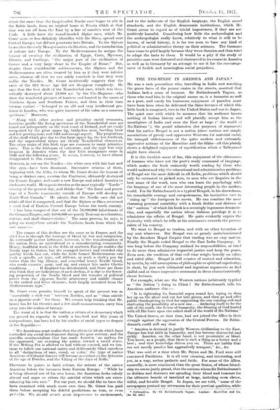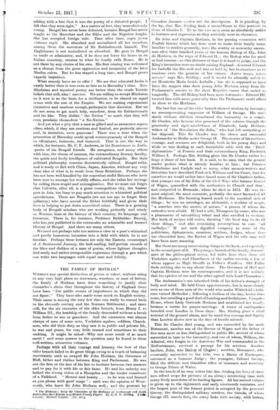THE NEO-HINDU IN AMERICA AND JAPAN.• Ho was a rash
generalizer who, travelling in India and watching the grave faces of the poorer castes in the streets, asserted that Indians lack a sense of humour. Sir Rabindranath Tagore, eo those who read him in the original assure us, is a humorist as well as a poet, and surely his humorous enjoyment of paradox must have been keen when he delivered the three lectures of which this little book is composed, two in the United States and one in Japan. The quiet ease with which he assumes that his audience }mows nothing of Indian history and will placidly accept him as the mouthpiece of India and even the East at large (" the world of No-Nations "), the genial admission (for purposes of argument) that his native Bengal is trot a nation (since nations are simply associations of greedy and oppressive Westerns for material ends), his tranquil obliviousness of the quite modern and extremely aggressive nations of the Marathas and the Sikhs—sell this plainly shows a delighted enjoyment of mystification which a Talleyrand might have shared.
It is this freakish sense of fun, this enjoyment of the obtuseness of humans who have not the poet's ready command of language, which makes the book eminently worth reading by those who would understand why the educational and administrative problems of Bengal are the most difficult in all India, problems which should only be entrusted to picked men, to men who are linguists in the best sense of the word, men who can learn the psychology with the language of one of the most interesting people in the modem world. For Sir Rabindranath is a typical Bengali, in his shrewdness, his remarkable courage and outspokenness, his instinctive tact in "sizing up" the foreigners he meets. He can combine the most charming personal amiability with a frank dislike and distrust of the nations of which his book is a seemingly ingenuous denuncia- tions, and especially the nation whose dubious privilege it is tin administer the affairs of Bengal. Ho quite evidently enjoys the dexterity with which Ile tells us his sentiments towards the present rulers of his country.
We went to Bengal as trader., and with no other indention of any sort whatever. But Bengal was no grossly maladminiatered by the decadent Mogul Empire that trading seas no easy matter. Finally the Moguls ceded Bengal to the East India Company. It was long before the Company realized its responsibilities, or tried to do more than administer impartial justice and keep the peace. Even now, the tradition of that evil time weighs heavily on rulers and ruled alike. Bengal is still evasive of control and education, by inertia, by odd assumptions of philosophic or spiritual superiority; in short, by just such whimsical and ingenious arguments as find skilful and at times impressive statement in these characteristically clever lectures.
For example, what are the Western nations (arbitrarily typified as "the Nation ") doing to China f Sir Rabindranath tells his American audience this :- " It is tightening its financial ropes round her, trying to drag, her up on the shore and cut. her into pieces, and then go and offer public thanksgiving to God for supporting the one existing evil and shattering the possffillity of a new one ... declaring itself to be the salt of the earth, the flower of humanity, the blessing of God hurled with all His force upon the naked skull of the world of No-Nations." The United States, at that time, had not joined the Allies in their struggle against the aggression of the Central Powers. Sir Rabin- dranath. could still say that "America is destined to justify Western civilization to the East. Europe has lost faith in humanity, and has become distrustful and sickly. America, on the other hand, is not pessimistic or blasé. You know, as a people, that there is such a thing as a better and a best ; and that knowledge drives you on. There are habits that are not merely passive but aggressively arrogant," etc., rkc.
That was said at a time when Mr. Bryan and Mr. Ford were still convinced Pacificista. It is all very anussing, and interesting, and yet, in a way, rather pathetic and futile. For none.of the Allier*, assuredly, is more convinced than the great States, of whose friend-. ship we are so justly proud, that the natiana whom Sir Rabindranath so dislikes and distrusts are spending, their blood and treasure fur. the ultimate benefit of mankind at large, including 'eves clever. wilful, and lovable Bengal. In Japan, we are told, "some of the- newspapers praised my utteranese for their poetical qualitlea,,while • 2Gdionaltim. By- Sit Itablindranath -Tegere. London: Macrallbo and CO. td. 551.1 adding with a leer that it was the poetry of a defeated people. I felt that they were right." As a matter of fact, they were obviously wrong. Bengal has never been defeated, because Bengal has never fought as the Marathon and the Sikhe and the Nepalese fought. She has accepted foreign rule. Time after time, cap& forum rictorem cepit. She absorbed and assimilated all her invaders, among them the ancestors of Sir Rabindranath himself. The Englishman is not assimilated or absorbed. He goes to Bengal to trade or administer, and, if he does not leave his bones in an Indian cemetery, returns to what he fondly calls Home. He is not there by any choice of his own. His first coming was welcomed as a change from the gross oppression and incapacity of the later Muslim rulers. But he has stayed a long time, and Bengal grows vaguely impatient.
What remedy have we to offer ? We see that educated India is vastly better than it was even so late as in Macaulay's time. Neo- Hinduism and mystical poetry are better than the crude Tantric beliefs that still, alas ! survive. We are willing to accept Hinduism an it now is as the basis for a civilization to be shared on equal terms with the rest of the Empire. We are making experiments (tentative and cautious enough, perhaps) in that direction. But we do not seem to get.much help, somehow, from Sir Rabindranath and his like. They dislike " the Nation " so much that they will even proclaim themselves " a No-Nation."
And yet what a pity that a race so gifted and so attractive rejects offers which, if they are cautious and limited, are perfectly sincere and, in intention, even generous I There was a time when the generation of Macaulay could [meek contemptuously of the Bengali as effeminate, insincere, and immoral. That is not the way in which, for instance, Mr. C. F. Andrews, in his Renaissance in India, speaks of his Bengali friends. He recognizes, and many others with him, the charm of manner, the extraordinary literary faculty, the quick and lively intelligence of cultivated Bengali& But their' political philosophy remains destructively critical. Bengal sulks, and is ready to flirt with China, Japan, America, without any very clear idea of what is to result from those flirtations. Perhaps she has not been well handled by the somewhat stolid Britons who have been sent to manage her worldly affairs, and she takes her revenge by calling thorn stupid and unimaginative. But we must not forget that Calcutta, after all, is a great cosmopolitan city, the busiest port in Asia, too busy to pay much attention to whimsical political speculations. There are Bengalis (we are too apt to forget their gallantry) who have served the Sirkar faithfully and given their lives in helping to put down anarchical crime. There is a growing body of Bengali scholars who are working patiently and wisely on Western lines at the history of their country, its language and literature. Them is, for instance, Professor Ralchaldas Banerji, who has just published in the vernacular an admirable and learned History of Bengal. And there are many others.
We need not perhaps take too serious a view of a poet's whimsical and partly humorous incursion into a field with which he is not familiar. Perhaps these lectures are only the Eastern counterpart of A Sentimental Journey, the half-smiling, half-pettish records of the likes and dislikes of a man of genius, whose lightest thoughts find ready and rather irresponsible expression through a pen which ran write two languages with equal- ease and felicity.



































 Previous page
Previous page